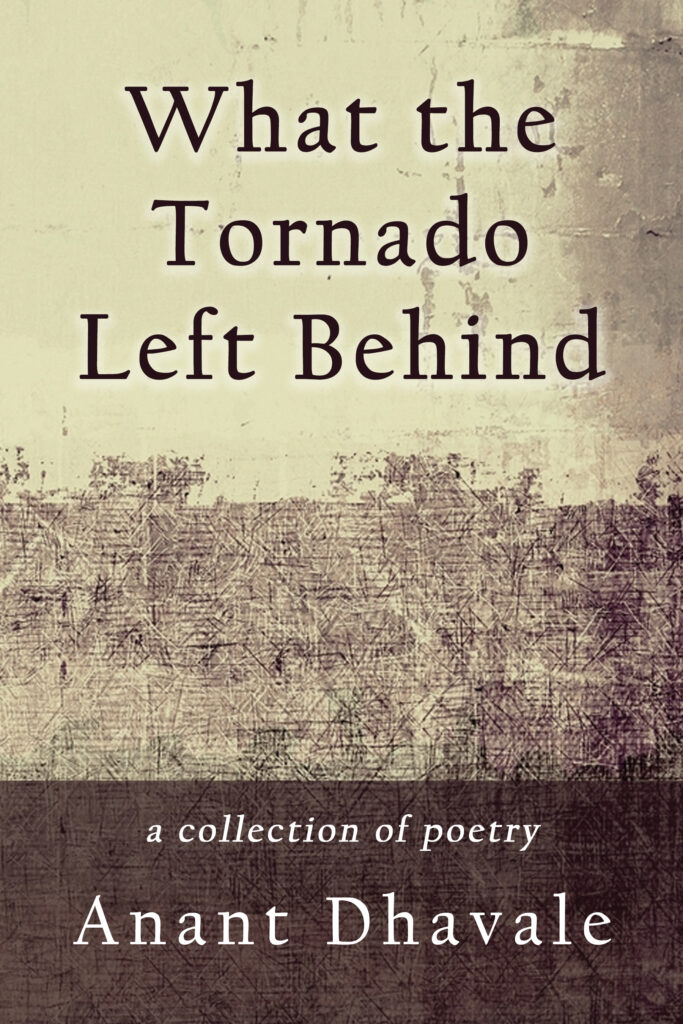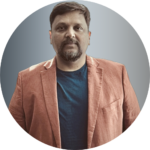Poet Anant Dhavale chats with me today about his new collection, What the Tornado Left Behind.

Bio:
Anant Dhavale is a multilingual poet and the author of four books, including the poetry collections What the Tornado Left Behind and Mook Aranyatali Paanagal; a speculative fiction novel Nobody’s War, and Meer, a biographical sketch of Meer Taqi Meer, one of the founding poets of Urdu poetry. Anant’s poems have appeared in journals such as Open Road Review, Mid-Atlantic Review, This Broken Shore (forthcoming), Minute Musings, Poets to Come, Aaj-Kal Urdu, and other notable publications. He is the founding editor of Samkaleen Ghazal, an online and print Marathi non-periodical dedicated to Marathi ghazals. Some of his works have been translated into Gujarati and Urdu. He lives in Harrison, New Jersey.
What do you enjoy most about writing poems?
Poems have an inner life of their own, they tend to stay on for as long as they can – with as many meanings and interpretations as can be drawn. A poem may begin with a specific thought and then grow into something entirely different over the course of writing. This fascinates me. It is as if poetry brings out thoughts and emotions that even I am not aware of. To me, each poem is like a milestone, it gives me a snapshot of how my inner world looked like at that point in time.
It is also fascinating how language as a medium impacts the presentation and the visage of a poem.
For example, my English poems have a shade of dark humor that rarely comes out in my Marathi or Urdu poems.
Can you give us a little insight into a few of your poems – perhaps a couple of your favorites?
“Nibbana, Unclaimed” is one of my personal favorites. The poem paints an intricate thought process through unrelated fragments; and because it flows with spoken word-esque intensity, it has also become an audience favorite at poetry readings. “One flat microcosm” is another such, in it I have tried to voice the now mostly forgotten angst of the Lenape people, through a narrative focused on the Passaic River.
What form are you inspired to write in the most? Why?
These days I write predominantly in free verse, with a semblance of an inner rhythm that follows thoughts and combination of words. I like how free verse allows you to build the tension line by line before the ultimate ending – whether an explosion or a muted, quiet expression. But forms like Haiku and Ghazal attract me to no bounds. I have been writing Ghazals for so long that it has become second nature for me. As an experiment of sorts, I have been using a social media platform (X), exclusively to publish my Haikus, raw and unedited as they occur to me.
What type of project are you working on next?
Far too many ideas in the works! I have been working on a novel, tentatively titled, “Evenings by the Elms,” on and off for some time. It is an existential take on the inner workings of a disinterested protagonist against the backdrop of COVID and the resulting socio-political chasm in American culture. Then there is this project where I am writing English Ghazals using classical meters like the Iambic Pentameter. Being less of a finisher, many of my projects tend to linger incomplete.
When did you first consider yourself a writer / poet?
I wasn’t so sure about it for a long time. Then, a leading poetry magazine accepted one of my poems. This provided me the validation I was looking for. I suppose this is natural for someone starting out as a new writer. It is okay to be unsure.

How do you research markets for your work, perhaps as some advice for not-yet-published poets?
I would recommend trying the self-publishing route since it can take too long to get traditionally published. Many small presses are run by editors with strong (at times rigid) inclinations to certain styles, making it difficult for a poet to find a publisher that shares their aesthetic. It is better to stick to what works best for you rather than altering your perspective just to get published. Every poet is unique, and I guess that is the beauty of poetry! Diversity is fun.
What would you say is your interesting writing quirk?
I like to hop from image to image, all within the realm of the same poem. I think this matches with the workings of the human mind processing multiple differing contexts at the same time.
As a child, what did you want to be when you grew up?
A cop! But the people around me told me it was dangerous, and I gave up on that thought pretty quickly.
Anything additional you want to share with the readers?
I want to thank readers for their continuous patronage of literature, and poetry in particular.
